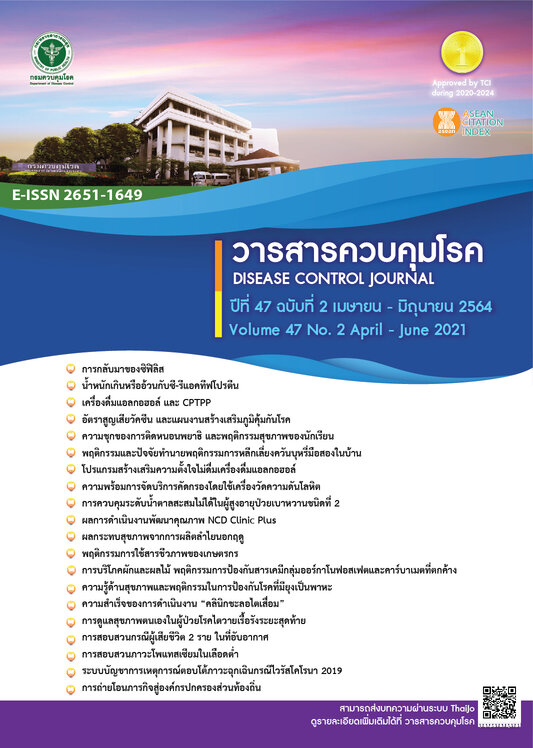The effect of the intention not of drinking alcohol program by applying the theory of planned behavior among the 10th grade students in Kongkrailat district, Sukhothai province
DOI:
https://doi.org/10.14456/dcj.2021.24Keywords:
student, program on promoting intention, not drink alcoholAbstract
The objective of this quasi-experimental research with control group repeated measurement was to examine the effect of the program on promoting the intention of not drinking alcohol by applying theories of planned behavior among the 10th grade students in Kongkrailat district, Sukhothai province. The samples were divided into 2 groups including 30 participants of the control group and 30 participants of the experimental group and were selected by the stratified sampling technique based on the qualifications specified in the selection criteria. The experimental group received a program for promoting the intention of not drinking alcohol by applying the theories of planned behavior, which included educational activities about alcohol consumption and its effects, establishing negative attitudes towards alcohol drinking habits, raising awareness, creating beliefs, providing support, building pressure, and creating motivation from those around them. Important reference groups will influence decisions and play an important role in helping them to achieve rejection skills. Cognitive ability to control alcohol drinking behavior was achieved and observed through various activities consisting of lectures, group discussions, role-play techniques, and social media prompts. Two-time follow-up measurements were before, immediately after the intervention, and 12 weeks after intervention program, while the control group received normal teaching. Data analysis included descriptive statistics with mean, percentage, standard deviation, and repeated measurement of variance to examine the effects of the program. The results indicated that after receiving the program after 12 weeks, the experimental group had a mean score of the intention of not drinking alcohol higher than that of the control group with statistical significance of 0.05. The experimental group had a mean score of alcohol drinking behavior significantly lower than the control group. The experimental group had a mean score of the intention of not drinking alcohol after the 12-week intervention higher than that before participating in the program, and higher than that of immediately after the experiment with a statistical significance of 0.05. However, the mean scores of alcohol drinking behaviors of the experimental group before, immediately after receiving the intervention and 12 weeks after participating in the program were not statistically significantly different. The results of the study are of benefit to those who are involved in applying the program to develop specific activities in combination with interpersonal and group or community-based theories by giving the families and school an opportunity to take part in the program. Programs should be designed to be adapted to a low level or directed towards non-routine behaviors.
Downloads
References
World Health Organization. Global status report on alcohol and health 2009. Geneva: World Health Organization; 2009.
World Health Organization. Global status report on alcohol and health 2014. Geneva: World Health Organization; 2014.
National Statistical Office (Thailand). Thailand cigarette smoking and drinking behavior survey 2015. Bangkok: National Statistical Office (Thailand); 2015.
Faden VB, Goldman M. The effect of alcohol on physiological process and biological development. Alcohol research & health. 2005;28(3):125-32.
Sornphaisan B, Kaewmungkhun J, Watthanaphon K, Nasueb S, Pimphandee W, Jongprasertying P, et al. Thailand alcohol situation 2009. Nonthaburi: Center for Alcohol Studies; 2009.
Assanangkornchai S, Muekthong A, Inthanon T. A surveillance of drinking behaviors and other health-risk behaviours among high school students in Thailand. Nonthaburi: Center of Alcohol Studies; 2008.
Kongkrailas Hospital. Report of alcohol drinking behavior survey of secondary school students in Kongkrailas District Sukhothai Province. Sukhotha: Kongkrailas; 2016.
Junyaem U, Yuttatri P. Prediction of undergraduate freshmen’s intentional abstinence of alcohol: Application of the theory of planned behaviour. Thai journal of nursing council. 2016;31(2):28-40.
Kophonrat S, Srisuriyawet R, Homsin P. Factors related to problematic drinking among male vocational students, Chonburi province. Journal of Nursing Science Chulalongkorn University. 2015;27(2):132-46.
Ajzen I. From intention to action: Theory of planned behavior [Internet]. Massachusetts. [cited 2016 Mar 26]. Available from: http://people.umass.edu/aizen/tpb.html
Phalasarn A, Duangsong R. The effectiveness of health education program by application of theory of planned behavior and social support for prevention alcohol drinking behavior among secondary level 4 Khongchaipattana sub-district, Khongchai district, Kalasin province. KKU Research Journal. 2011;11(1):83-92.
Ponprisan P, Promarak T, Thaewpia S. The Application program for prevention alcohol consumption of the student among Laoklangwittayakhom secondary school, Laoklang Sub-district, Khongchai district, Kalasin Province. Journal of Sakon Nakhon Hospital. 2015;18(2):129-38.
Downloads
Published
How to Cite
Issue
Section
License
Articles published in the Disease Control Journal are considered as academic work, research or analysis of the personal opinion of the authors, not the opinion of the Thailand Department of Disease Control or editorial team. The authors must be responsible for their articles.






